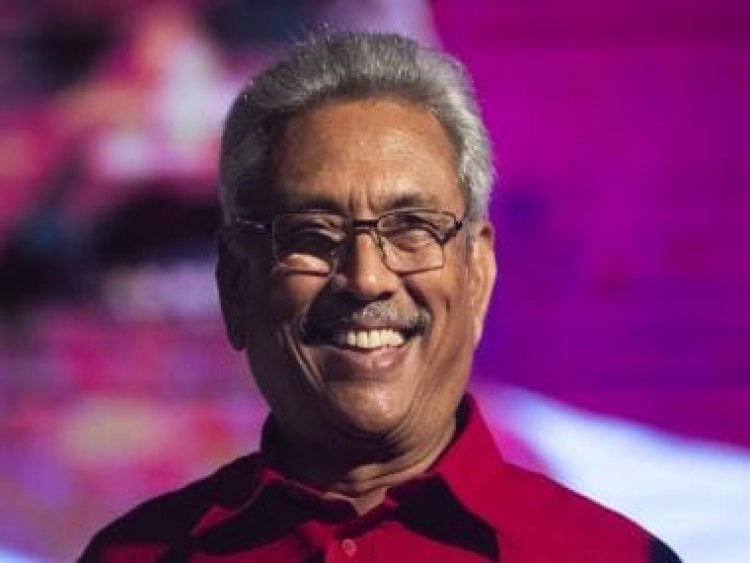Explained: Why Sri Lanka’s Gotabaya Rajapaksa picked Maldives as a getaway
Explained: Why Sri Lanka’s Gotabaya Rajapaksa picked Maldives as a getaway

Sri Lanka’s embattled president Gotabaya Rajapaksa fled to the Maldives in the early hours of Wednesday as protests continued to engulf his crisis-ravaged nation.
Rajapaksa, his wife and two bodyguards, travelled to the Maldives on a military jet after obtaining the approval of the Maldives defence ministry, reported ANI.
Rajapaksa was received by representatives of the Maldivian government at Velana airport.
But why did Rajapaksa pick Maldives? Let’s take a closer look:
Much of it may be due to Rajapaksa’s ‘close friendship’ with Maldivian Parliament Speaker and former president Mohamed Nasheed.
After all, it was Nasheed that negotiated Rajapaksa's escape from Sri Lanka to the Maldives sources told PTI.
As per local media reports, initial requests to land the military aircraft in the Maldives were initially denied by the Civil Aviation Authority in Maldives, but later approved at Nasheed’s request.
A spokesperson for Nasheed did not confirm or deny the intervention to CNN.
Long relationship with Lanka
Nasheed has had a long relationship with Sri Lanka and its political elite.
As a youth, Nasheed studied in Colombo.
After the September 2003 Male riots, Nasheed left the Maldives for Sri Lanka. While in exile there he helped found the opposition Maldivian Democratic Party (MDP) in November 2004.
In 2016, he left Maldives again for Sri Lanka, where he remained till late 2018.
As per The Print, Nasheed has close ties to Sri Lanka’s political leaders across the spectrum.
A couple of months ago, Sri Lanka’s then prime minister, Ranil Wickremesinghe, had granted Nasheed’s request to be appointed “coordinator” of Male’s relief efforts for Colombo, as per the report.
That appointment raise questions about whether Nasheed was trying to create an ‘exit strategy’ for the Rajapaksas.
“President Nasheed of the Maldives categorically denies biased reports of playing a role in the so called “exit strategy” of political leaders in Sri Lanka. His role for Sri Lanka is limited to seeking assistance for a country and people who have always been mutual friends especially in this difficult economic period,” his office, rubbishing the claims, told Sri Lankan daily in May.
Maldives govt faces backlash
Meanwhile, the Maldives government is facing backlash.
The Sun Online reported that the Progressive Party of Maldives in a statement said military aircraft belonging to a foreign nation would only be permitted inside Maldivian airspace with approval from the Maldives National Defense Force.
“Calling on President Ibrahim Mohamed Solih, Speaker Mohamed Nasheed, Mariya Ahmed Didi [defence minister], Abdulla Shamaal [chief of defence forces] and Abdulla Shahid to take responsibility for subjecting Maldivians residing at Sri Lanka to harm’s way by granting asylum for the country’s president against the wishes of Sri Lankan citizens. Also calling to expedite efforts to ensure the safety and security of Maldivians residing at Sri Lanka,” the PPM’s statement said.
The Ministry of Foreign Affairs spokesperson has refused to comment on Rajapaksa’s arrival, Maldivian news outlet The Edition reported.
What’s next for Rajapaksa?
Diplomatic sources told ThePrint Rajapaksa is exploring ‘all options’ in search of a safe haven. Sources also noted that Gotabaya has properties in Dubai and he is awaiting permission from UAE. Failing that, he will go to Singapore which has a vast Sri Lankan diaspora.
According to the Sri Lankan news outlet Tamil Guardian, Rajapaksa plans to fly to Singapore soon.
For the time being, he may remain in Maldives, as per the Print.
Meanwhile, Sri Lanka's acting President Ranil Wickremesinghe instructed armed forces and police to bring the situation under control.
As protests intensified in the Sri Lankan capital city of Colombo, protestors who had gathered outside Sri Lanka Prime Minister's office have taken over his residence at Flower Road here.
Security personnel resorted to tear-gas shelling to drive away protestors on the streets of Colombo.
Wickremesinghe Wednesday declared an emergency and imposed a curfew in the western province of the country as protesters came prepared to face tear gas shelling by security forces deployed outside Wickremesinghe's residence. Air patrolling has also started around the PM's residence.
The country's Opposition leader Sajith Premadasa said that the PM cannot exercise the powers of the President, and cannot declare a curfew or a state of emergency.
"PM becomes acting President only if the President appoints him as such, or if the office of President is vacant, or if the CJ in consultation with the Speaker forms the view that the President is unable to act," Premadasa tweeted.
"In the absence of any of these, the PM cannot exercise the powers of President, and cannot declare curfew or a state of emergency," he said in another tweet.
Military personnel used tear gas shells to disperse protestors who scaled the wall to enter the Sri Lankan PM's residence in Colombo.
73-year-old Gotabaya Rajapaksa had gone into hiding after crowds of protesters stormed his residence on 9 July and he had announced that he will resign on 13 July.
The country is facing a severe shortage of fuel and other essential supplies and is in the throes of its worst-ever economic crisis with soaring inflation.
With inputs from agencies
Read all the Latest News, Trending News, Cricket News, Bollywood News, India News and Entertainment News here. Follow us on Facebook, Twitter and Instagram.
What's Your Reaction?




























































